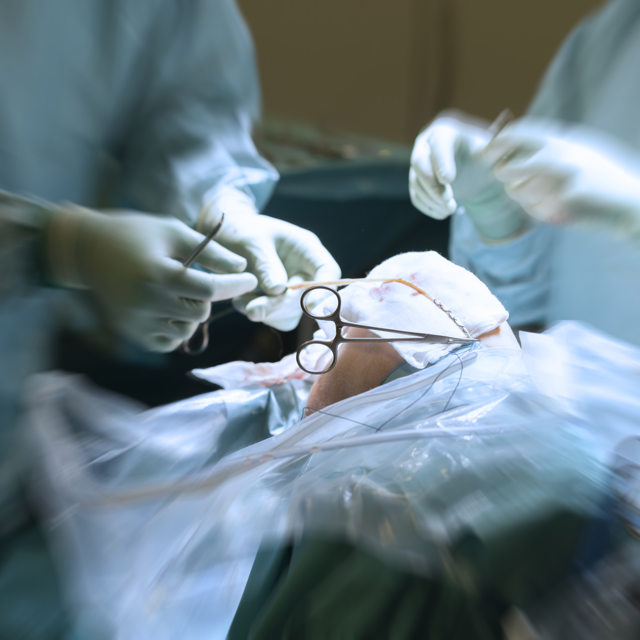
What are the Signs of Needing a Hip Replacement?
Hip Replacement Surgery
Arthritis, age, and overuse all can cause the “shock absorbers” in our joints to wear away. When the damage is severe enough to produce bone-on-bone contact in your hip joint, the resulting pain and stiffness make simple activities like walking and climbing stairs unbearable. Surgery to replace all or part of the worn-out hip joint surfaces can improve mobility, reduce pain, and allow you to resume the activities you enjoy.
Hip replacement surgery is growing more common, with nearly 300,000 patients electing for the surgery annually in the United States. The average age of patients is also decreasing, partially because prosthetic joints are improving in quality, now lasting more than 20 years. This longevity gives patients peace of mind to replace their hips without worrying about the artificial joint wearing down.
Penn Highlands Healthcare is the first health system in Northwest Central Pennsylvania to offer Mako SmartRoboticTM joint replacement surgery by specially trained orthopedic surgeons.
Mako SmartRobotic at Penn Highlands Healthcare is an innovative surgical solution for many people suffering from painful arthritis or degeneration of the knee or hip. The Mako robot uses 3D CT-based planning software so your orthopedic surgeon can know more, and cut less. That is, the CTscan helps your Penn Highlands orthopedic surgeon understand more about your unique anatomy to create a joint replacement surgical plan that is extraordinarily advanced in precision and customization to your body.
Who is a Candidate for Hip Replacement Surgery?
People whose daily activities are severely limited by hip pain may be candidates for hip replacement surgery, partial hip replacement, or hip resurfacing. Your orthopedic surgeon will consider surgery after careful examination. This may include taking images such as a CT or MRI scan to help diagnosis your particular joint problem, and after more conservative measures such as exercise, physical therapy, and medications have been exhausted. The timing of hip replacement surgery is unique to every patient and depends on many factors, including the extent of damage to your joint, your pain tolerance, activity level, and general health. It’s important not to wait too long or have surgery too soon, so it is important to consult an orthopedic surgeon early in the process to help you decide the timing.
Is Mako SmartRoboticsTM an Option for my Hip Replacement?
Your orthopedic surgeon at Penn Highlands Healthcare can help you determine whether Mako SmartRobot surgery is right for your hip replacement procedure.
Many hip replacement patients may be a candidate to have their surgery completed with their orthopedic surgeon using the MakoTM Robotic Arm. The result of a procedure performed with Mako SmartRobotics can differ from traditional joint replacement surgery with fewer soft tissue releases and smaller incisions, less blood loss, protection of healthy bone, and ultimately optimal joint alignment and faster recovery.
Find a Penn Highlands orthopedic surgeon who specializes in using the MakoTM SmartRobot.
What Happens During Hip Replacement Surgery and Hip Resurfacing?
Total hip replacement is a surgical procedure in which an orthopedic surgeon replaces the worn-out surfaces of the hip—the ball and socket—with metal components. Some surgeons access the joint from the front of the body (as opposed to the back or side), an approach known as anterior hip replacement. This approach may allow your orthopedic surgeon to make a smaller incision, resulting in less disruption to surrounding muscles and fewer restrictions after surgery.
During hip resurfacing, the worn surfaces of the hip are resurfaced with man-made components. Less bone is removed with hip resurfacing than with hip replacement. Rather than having the entire femoral head, or “ball” of the hip, removed as with hip replacement, hip resurfacing involves reshaping the femoral head to receive a metal “cap.” The socket side of the hip or acetabulum is relined very similarly to a hip replacement.
What are the Advantages of Hip Resurfacing?
Hip resurfacing is most commonly recommended for younger patients with severe arthritis of the hip who could be faced with multiple joint replacement surgeries over their lifetime. Older patients who may have extensive damage to the joint may benefit more from hip replacement. Every type of hip surgery has a distinct set of benefits and risks and your orthopedic surgeon will assess your individual needs when considering the optimal surgery.
In general, the potential advantages to hip resurfacing, compared to a total hip replacement. These include:
- Bone preservation: With total hip replacement, the entire femoral head or “ball” is removed and a metal stem is inserted into the femoral canal. If the hip later needs to be revised, a longer and larger stem is needed, requiring additional bone removal and a more difficult operation. With hip resurfacing, the femoral neck and part of the femoral head is preserved, making revision surgery (if needed) less difficult.
- Less risk for dislocation: With hip resurfacing, the femoral head size is typically larger than with hip replacement, allowing for better range of motion and improved stability. This is important for younger, more active patients.
- Low-wear bearing: Metal-on-metal hip resurfacing implants were developed for younger patients in an effort to reduce the need for revision due to wearing as the patient ages.
What is Recovery Like After Hip Replacement or Hip Resurfacing Surgery?
Following your hip replacement surgery or hip resurfacing surgery, you will be moved to a room in a dedicated joint replacement unit. From there, your care team will work with you get your recovery off to a good start in the first 24 to 48 hours following your surgery. The sooner you begin using your hip, the more successful and faster your recovery process will be. You can expect to experience some discomfort following hip replacement, but your care team will work with you to find a combination of IV and oral medications, as well as nerve blocks, to manage your pain.
Many patients go straight from the hospital to continue their recovery at home. However, if you are feeling apprehensive about continuing the process, particularly if you live alone, you may decide to spend a few more days receiving extra assistance in a rehabilitation center.
You can expect to use a walker or crutches for the first four weeks following surgery. After two or three weeks, you can be cleared to begin driving, and after 10 to 12 weeks, you will be able to resume more strenuous activities, such as golfing or taking longer walks. There are a few activities, such as singles tennis and skiing, that are not recommended for people with an artificial hip.
What are the Risks of Hip Replacement Surgery?
Hip replacement surgery is a major surgery. There is potential risk of complications including infection, nerve or blood vessel damages, hip dislocation, change of leg length, and blood clots in your leg veins. Your Penn Highlands orthopedic surgeon and the rest of your specialized care team will be focused on minimizing your risk of these and other complications. You and your family members also play an important role in reducing risks. For instance, stopping smoking, maintaining steady blood sugar levels, and practicing good wound cleaning help reduce the risk of infection. Your Penn Highlands joint replacement team will provide education to help you understand your role.

Orthopedics / Orthopedic Surgery
Sports Medicine
Penn Highlands Orthopedics and Sports Medicine - HuntingdonA Service of Penn Highlands Huntingdon
Penn Highlands Orthopedics and Sports Medicine - Tyrone

Orthopedics / Orthopedic Surgery
Sports Medicine
Penn Highlands Orthopedics and Sports Medicine - ClearfieldA Service of Penn Highlands DuBois
Penn Highlands Orthopedics and Sports Medicine - PhilipsburgA Service of Penn Highlands DuBois
Penn Highlands Orthopedics and Sports Medicine - St. MarysA Service of Penn Highlands DuBois

Orthopedics / Orthopedic Surgery
Penn Highlands Orthopedics and Sports Medicine - ClearfieldA Service of Penn Highlands DuBois
Penn Highlands Orthopedics and Sports Medicine - DuBois COEA Service of Penn Highlands DuBois
View Providers Practice
Orthopedics / Orthopedic Surgery
Penn Highlands Orthopedics and Sports Medicine - Rostraver TownshipA Service of Penn Highlands Mon Valley
Penn Highlands Orthopedics and Sports Medicine - Uniontown
View Providers Practice
Orthopedics / Orthopedic Surgery
Penn Highlands Orthopedics and Sports Medicine - ConnellsvilleA Service of Penn Highlands Connellsville
Penn Highlands Orthopedics and Sports Medicine - Uniontown
View Providers Practice
Orthopedics / Orthopedic Surgery
Penn Highlands Orthopedics and Sports Medicine - Charleroi
Penn Highlands Orthopedics and Sports Medicine - Rostraver TownshipA Service of Penn Highlands Mon Valley
View Providers Practice
Orthopedics / Orthopedic Surgery
Sports Medicine
Penn Highlands Orthopedics and Sports Medicine - DuBoisA Service of Penn Highlands DuBois
View Providers Practice

